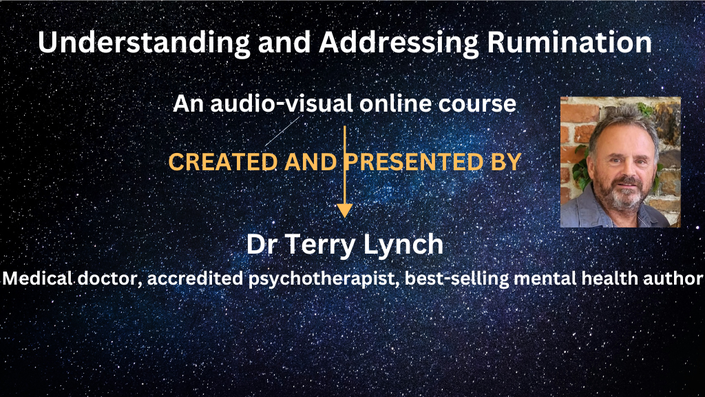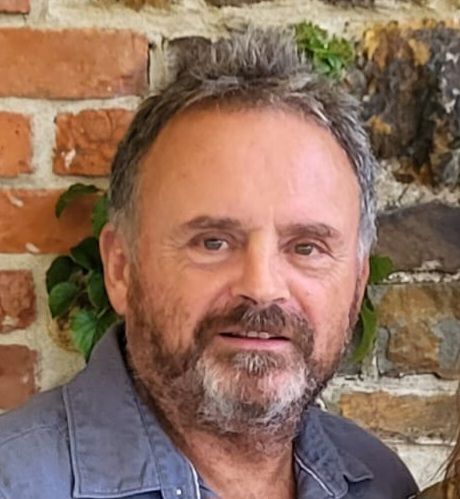
Understanding and Addressing Rumination
This course is for anyone who regularly finds themselves engaging in rumination. This course will also be valuable to mental health professionals such as counsellors, psychotherapists, psychologists, social workers, medical doctors and other mental health professionals who work with people for whom rumination is a recurring issue.
Testimonials:
I launched this course on 14th November 2024. Here are seven testimonials I have received so far from course participants. Three are from therapists:
1.“Hi Terry, the course is very interesting and useful. I love the way you give a succinct description of what rumination is followed by strategies that can be introduced in everyday life. I have shared them with my family, one of whom commented on how they appreciated your proactive approach to giving strategies that can be used in a step by step approach. We are lucky to be able to benefit from your vast experience and learning as well as your kindness towards all. I look forward to continuing to learn from you. Warm wishes to you, Andrea.”
2. "Dear Dr. Lynch, I LOVE your course. I am so delighted to see that you continue your work, continuing to push against myths and to elevate helpful information. Thank you for your commitment to mental health and to the individuals who struggle. You are making a true difference. I am even getting up from my computer to practice being present.....It's so helpful.. The course was clear, focused and practical. You are an excellent teacher. All my best, Rachel."
3. “Dear Terry, thank you for sharing your thoughts, experiences and insightfulness in developing this course on rumination. I especially liked the mindfulness application to interrupt the rumination process which is efficient and effective. I look forward to receiving more insights on mental health care in the future. Kind regards, Mary”.
4. "Hi Terry, I enjoyed this course. It is really helpful to be able to go through the course again, a second time as there is so much information to reflect on. I found it really helpful for me personally and hopefully others that I work with. I noticed a lot of Choice Theory throughout. Dr.Glasser's conflicting pictures in Quality World. Great to have mindfulness integrated into this course. I have passed the course information on also. I will definitely be mentioning your courses to my group. Really looking forward to your next course. Warmest Regards, Paulette."
5. "The course was excellent. Succinct and applicable. Margaret."
6. “Hello Terry, I have completed your course "Understanding and Addressing Rumination" just now. I found your course a useful tool to add to my list of readings and online training programmes I often recommend to my clients and colleagues. The language and information provided is simplistic and to the point, thus making it ideal for clients to absorb into their daily thinking and living. I'm looking forward to the next course and I'm certainly going to view the few videos you sent on.” Eleanor.
7. “Hi Terry, I just wanted to send you a short email to thank you for the rumination course, which I've just completed. I thoroughly enjoyed it, and I am looking forward to going back over my notes and absorbing the information further. I particularly appreciated the structure of the notes themselves, the formatting, the 'arrows' and definitions; I found them easy to follow. I will also incorporate some of the language into my own work with clients, again, keeping the sole focus on understanding rumination and offering very simple, but important strategies to help a person take control, making a choice in not being held prisoner to rumination. Being able to better explain to clients that they always hold the key to exiting this state of mind; your course offers a very important key to the client in this regard.” Michael.
.
- “Hi Terry, I just wanted to send you a short email to thank you for the rumination course, which I've just completed. I thoroughly enjoyed it, and I am looking forward to going back over my notes and absorbing the information further. I particularly appreciated the structure of the notes themselves, the formatting, the 'arrows' and definitions; I found them easy to follow. I'm looking forward to the next course and I'm certainly going to view the few videos you sent on.” Eleanor.
- “Hello Terry, I have completed your course "Understanding and Addressing Rumination" just now. I found your course a useful tool to add to my list of readings and online training programmes I often recommend to my clients and colleagues. The language and information provided is simplistic and to the point, thus making it ideal for clients to absorb into their daily thinking and living. I will also incorporate some of the language into my own work with clients, again, keeping the sole focus on understanding rumination and offering very simple, but important strategies to help a person take control, making a choice in not being held prisoner to rumination. Being able to better explain to clients that they always hold the key to exiting this state of mind; your course offers a very important key to the client in this regard.” Michael.
This course consists of three modules:
1. What rumination actually is
Definition of rumination. Psychiatry’s understanding of rumination, and the flaws within this
2. Making sense of rumination
Making sense of rumination; the importance of context; characteristics of people who ruminate; a range of habits/patterns/coping strategies/ways of operating; the present, past and future; why some people spend so little time consciously in the present; the “gains” from habitual rumination; the “losses” of rumination; why addressing rumination feels so challenging.
3. Addressing rumination
Accept and be aware of your current situation; you are creating a comprehensive strategy to address your rumination; do not set a time frame; view this as an ongoing moment-to-moment project; prioritise noticing early when you slip into rumination; immediately interrupt the flow of ruminating thoughts; what to do when you care caught off guard – and you will be; having interrupted the flow of ruminating thoughts, place your focus/attention elsewhere; a fact about the mind that we use in this work; 2-minute mindfulness exercise; the purpose of this exercise; the picture/store, picture store effect; data banks within us; what we focus on, grows; when our minds do not compute the word “don’t”; difficulty distinguishing fact from fiction; other allied strategies for addressing rumination; how to work with these strategies to get the results you want; be gentle and kind to yourself on this journey; know that, in the early stages, you will often slip into old habits; “mindfulness is, when you are washing the dishes, you are washing the dishes”; freeing yourself from being a slave to your emotions; be gentle and kind to yourself on this healing journey; inertia and momentum, as these apply to rumination.
Refund:
A 30-day "no-quibble" refund applies to this course of for any reason you are dissatisfied with the course.
Get started now!
Your Instructor

Terry's own life experiences and his life as a mental health activist, medical doctor, psychotherapist and mental health author have brought him to a level of understanding of mental health that is unusual if not indeed exceptional.
Terry Lynch has played a prominent role in mental health both nationally and internationally. For a nine-year period, he was appointed by the Irish Department of Health and Children to key national mental health groups - The Expert Group on Mental health Policy (2003-6) which formulated A Vision for Change, Ireland’s official mental health policy document; The Independent Monitoring Group for A Vision for Change (2006-9); the Second Monitoring Group for A Vision for Change (2009-12).
Terry Lynch was the only mental health professional to be appointed to the three Groups named above. In addition, he was also appointed by the CEO of the Irish Health Service Executive (HSE) to the Irish Health Service Executive's Mental Health Expert Advisory Group (2006-8).
Terry is the author of 4 books: Prescribed Drug Dependence (Kindle, 2018); Depression Delusion Volume One: The Myth of the Brain Chemical Imbalance (2015); Selfhood: A Key to the Recovery of Emotional Wellbeing, Mental Health and the Prevention of Mental Health Problems, (2011); and best-seller Beyond Prozac: Healing Mental Distress (2004).
He has appeared regularly in the national media in Ireland and beyond.



